Assisted Suicide: Benefits, Ethics, and Resource Allocation Analysis
VerifiedAdded on 2023/01/12
|6
|1437
|30
Essay
AI Summary
This essay provides a comprehensive analysis of assisted suicide, examining its benefits, ethical considerations, and counterarguments. The paper begins by defining assisted suicide and highlighting its increasing prominence due to the rise of terminal illnesses. The essay then explores the key benefits, including pain relief for terminally ill patients, financial resource savings for patients and their families, and efficient allocation of limited healthcare resources. However, it also addresses the counterarguments, such as the sanctity of life, potential for medical advancements, and the risk of corruption within the healthcare industry. Furthermore, the essay discusses the importance of dignity and respect in end-of-life care. The author concludes that while ethical and moral concerns exist, the benefits of assisted suicide often outweigh the negatives, as evidenced by the arguments presented.
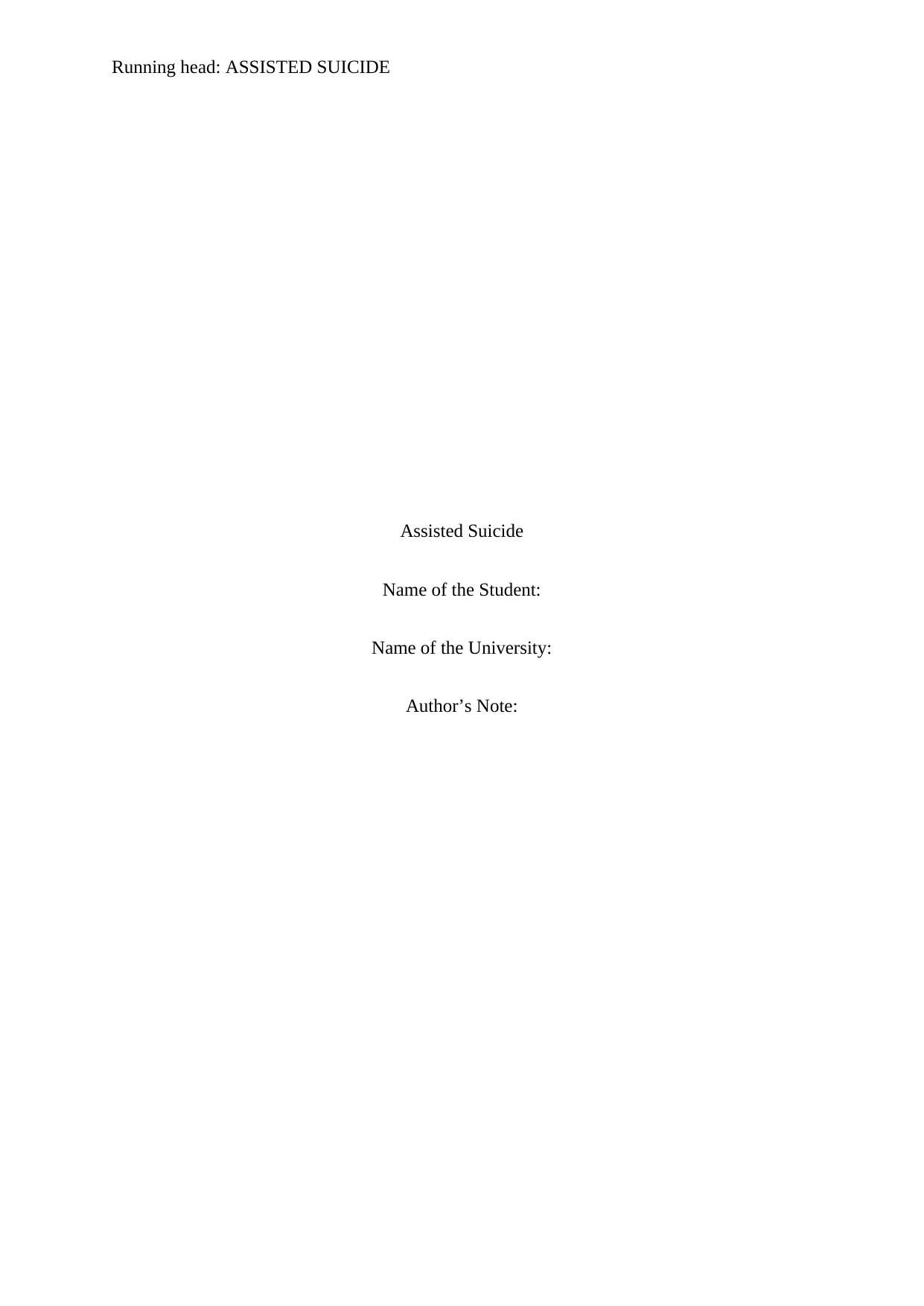
Running head: ASSISTED SUICIDE
Assisted Suicide
Name of the Student:
Name of the University:
Author’s Note:
Assisted Suicide
Name of the Student:
Name of the University:
Author’s Note:
Paraphrase This Document
Need a fresh take? Get an instant paraphrase of this document with our AI Paraphraser
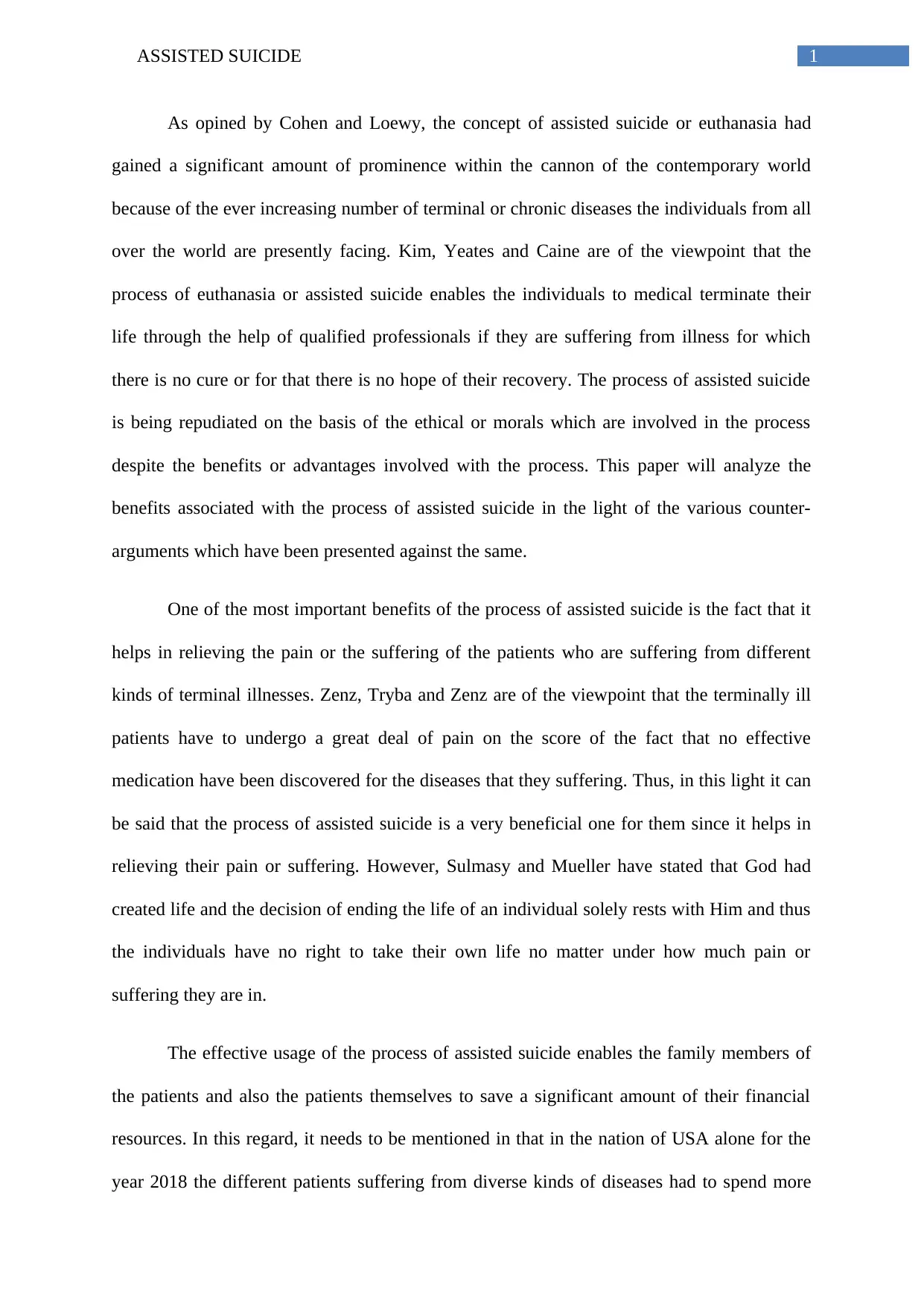
1ASSISTED SUICIDE
As opined by Cohen and Loewy, the concept of assisted suicide or euthanasia had
gained a significant amount of prominence within the cannon of the contemporary world
because of the ever increasing number of terminal or chronic diseases the individuals from all
over the world are presently facing. Kim, Yeates and Caine are of the viewpoint that the
process of euthanasia or assisted suicide enables the individuals to medical terminate their
life through the help of qualified professionals if they are suffering from illness for which
there is no cure or for that there is no hope of their recovery. The process of assisted suicide
is being repudiated on the basis of the ethical or morals which are involved in the process
despite the benefits or advantages involved with the process. This paper will analyze the
benefits associated with the process of assisted suicide in the light of the various counter-
arguments which have been presented against the same.
One of the most important benefits of the process of assisted suicide is the fact that it
helps in relieving the pain or the suffering of the patients who are suffering from different
kinds of terminal illnesses. Zenz, Tryba and Zenz are of the viewpoint that the terminally ill
patients have to undergo a great deal of pain on the score of the fact that no effective
medication have been discovered for the diseases that they suffering. Thus, in this light it can
be said that the process of assisted suicide is a very beneficial one for them since it helps in
relieving their pain or suffering. However, Sulmasy and Mueller have stated that God had
created life and the decision of ending the life of an individual solely rests with Him and thus
the individuals have no right to take their own life no matter under how much pain or
suffering they are in.
The effective usage of the process of assisted suicide enables the family members of
the patients and also the patients themselves to save a significant amount of their financial
resources. In this regard, it needs to be mentioned in that in the nation of USA alone for the
year 2018 the different patients suffering from diverse kinds of diseases had to spend more
As opined by Cohen and Loewy, the concept of assisted suicide or euthanasia had
gained a significant amount of prominence within the cannon of the contemporary world
because of the ever increasing number of terminal or chronic diseases the individuals from all
over the world are presently facing. Kim, Yeates and Caine are of the viewpoint that the
process of euthanasia or assisted suicide enables the individuals to medical terminate their
life through the help of qualified professionals if they are suffering from illness for which
there is no cure or for that there is no hope of their recovery. The process of assisted suicide
is being repudiated on the basis of the ethical or morals which are involved in the process
despite the benefits or advantages involved with the process. This paper will analyze the
benefits associated with the process of assisted suicide in the light of the various counter-
arguments which have been presented against the same.
One of the most important benefits of the process of assisted suicide is the fact that it
helps in relieving the pain or the suffering of the patients who are suffering from different
kinds of terminal illnesses. Zenz, Tryba and Zenz are of the viewpoint that the terminally ill
patients have to undergo a great deal of pain on the score of the fact that no effective
medication have been discovered for the diseases that they suffering. Thus, in this light it can
be said that the process of assisted suicide is a very beneficial one for them since it helps in
relieving their pain or suffering. However, Sulmasy and Mueller have stated that God had
created life and the decision of ending the life of an individual solely rests with Him and thus
the individuals have no right to take their own life no matter under how much pain or
suffering they are in.
The effective usage of the process of assisted suicide enables the family members of
the patients and also the patients themselves to save a significant amount of their financial
resources. In this regard, it needs to be mentioned in that in the nation of USA alone for the
year 2018 the different patients suffering from diverse kinds of diseases had to spend more
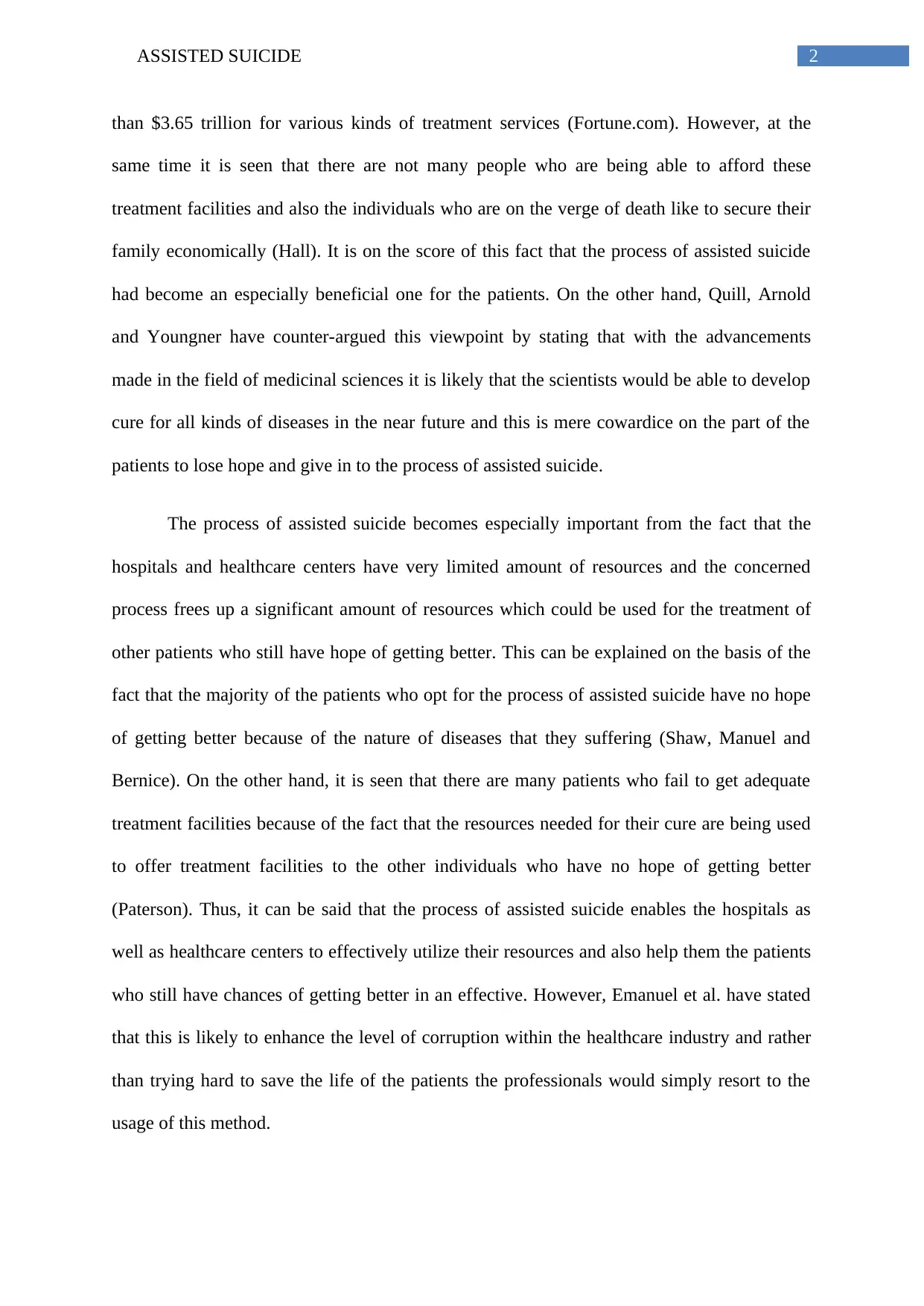
2ASSISTED SUICIDE
than $3.65 trillion for various kinds of treatment services (Fortune.com). However, at the
same time it is seen that there are not many people who are being able to afford these
treatment facilities and also the individuals who are on the verge of death like to secure their
family economically (Hall). It is on the score of this fact that the process of assisted suicide
had become an especially beneficial one for the patients. On the other hand, Quill, Arnold
and Youngner have counter-argued this viewpoint by stating that with the advancements
made in the field of medicinal sciences it is likely that the scientists would be able to develop
cure for all kinds of diseases in the near future and this is mere cowardice on the part of the
patients to lose hope and give in to the process of assisted suicide.
The process of assisted suicide becomes especially important from the fact that the
hospitals and healthcare centers have very limited amount of resources and the concerned
process frees up a significant amount of resources which could be used for the treatment of
other patients who still have hope of getting better. This can be explained on the basis of the
fact that the majority of the patients who opt for the process of assisted suicide have no hope
of getting better because of the nature of diseases that they suffering (Shaw, Manuel and
Bernice). On the other hand, it is seen that there are many patients who fail to get adequate
treatment facilities because of the fact that the resources needed for their cure are being used
to offer treatment facilities to the other individuals who have no hope of getting better
(Paterson). Thus, it can be said that the process of assisted suicide enables the hospitals as
well as healthcare centers to effectively utilize their resources and also help them the patients
who still have chances of getting better in an effective. However, Emanuel et al. have stated
that this is likely to enhance the level of corruption within the healthcare industry and rather
than trying hard to save the life of the patients the professionals would simply resort to the
usage of this method.
than $3.65 trillion for various kinds of treatment services (Fortune.com). However, at the
same time it is seen that there are not many people who are being able to afford these
treatment facilities and also the individuals who are on the verge of death like to secure their
family economically (Hall). It is on the score of this fact that the process of assisted suicide
had become an especially beneficial one for the patients. On the other hand, Quill, Arnold
and Youngner have counter-argued this viewpoint by stating that with the advancements
made in the field of medicinal sciences it is likely that the scientists would be able to develop
cure for all kinds of diseases in the near future and this is mere cowardice on the part of the
patients to lose hope and give in to the process of assisted suicide.
The process of assisted suicide becomes especially important from the fact that the
hospitals and healthcare centers have very limited amount of resources and the concerned
process frees up a significant amount of resources which could be used for the treatment of
other patients who still have hope of getting better. This can be explained on the basis of the
fact that the majority of the patients who opt for the process of assisted suicide have no hope
of getting better because of the nature of diseases that they suffering (Shaw, Manuel and
Bernice). On the other hand, it is seen that there are many patients who fail to get adequate
treatment facilities because of the fact that the resources needed for their cure are being used
to offer treatment facilities to the other individuals who have no hope of getting better
(Paterson). Thus, it can be said that the process of assisted suicide enables the hospitals as
well as healthcare centers to effectively utilize their resources and also help them the patients
who still have chances of getting better in an effective. However, Emanuel et al. have stated
that this is likely to enhance the level of corruption within the healthcare industry and rather
than trying hard to save the life of the patients the professionals would simply resort to the
usage of this method.
⊘ This is a preview!⊘
Do you want full access?
Subscribe today to unlock all pages.

Trusted by 1+ million students worldwide
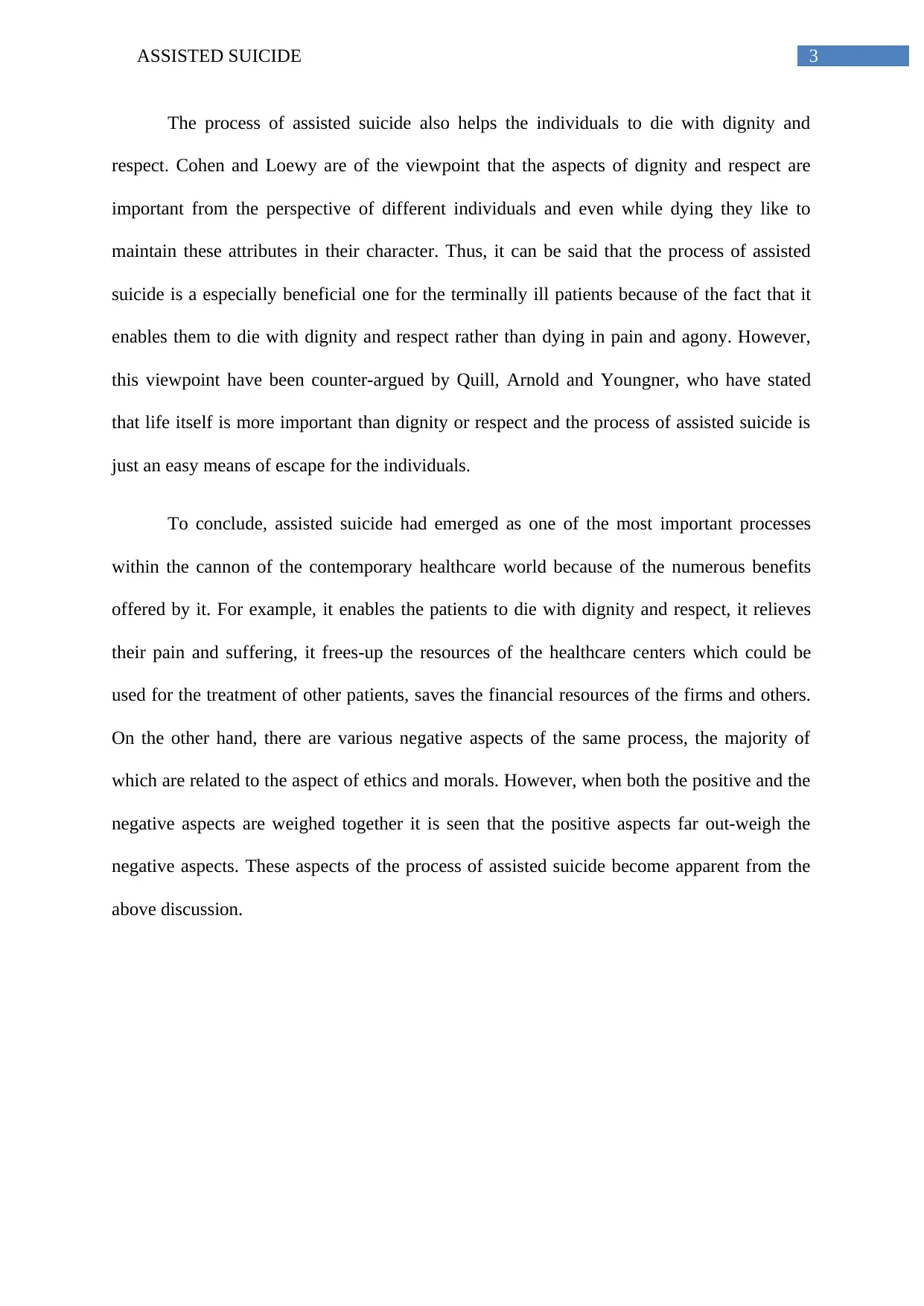
3ASSISTED SUICIDE
The process of assisted suicide also helps the individuals to die with dignity and
respect. Cohen and Loewy are of the viewpoint that the aspects of dignity and respect are
important from the perspective of different individuals and even while dying they like to
maintain these attributes in their character. Thus, it can be said that the process of assisted
suicide is a especially beneficial one for the terminally ill patients because of the fact that it
enables them to die with dignity and respect rather than dying in pain and agony. However,
this viewpoint have been counter-argued by Quill, Arnold and Youngner, who have stated
that life itself is more important than dignity or respect and the process of assisted suicide is
just an easy means of escape for the individuals.
To conclude, assisted suicide had emerged as one of the most important processes
within the cannon of the contemporary healthcare world because of the numerous benefits
offered by it. For example, it enables the patients to die with dignity and respect, it relieves
their pain and suffering, it frees-up the resources of the healthcare centers which could be
used for the treatment of other patients, saves the financial resources of the firms and others.
On the other hand, there are various negative aspects of the same process, the majority of
which are related to the aspect of ethics and morals. However, when both the positive and the
negative aspects are weighed together it is seen that the positive aspects far out-weigh the
negative aspects. These aspects of the process of assisted suicide become apparent from the
above discussion.
The process of assisted suicide also helps the individuals to die with dignity and
respect. Cohen and Loewy are of the viewpoint that the aspects of dignity and respect are
important from the perspective of different individuals and even while dying they like to
maintain these attributes in their character. Thus, it can be said that the process of assisted
suicide is a especially beneficial one for the terminally ill patients because of the fact that it
enables them to die with dignity and respect rather than dying in pain and agony. However,
this viewpoint have been counter-argued by Quill, Arnold and Youngner, who have stated
that life itself is more important than dignity or respect and the process of assisted suicide is
just an easy means of escape for the individuals.
To conclude, assisted suicide had emerged as one of the most important processes
within the cannon of the contemporary healthcare world because of the numerous benefits
offered by it. For example, it enables the patients to die with dignity and respect, it relieves
their pain and suffering, it frees-up the resources of the healthcare centers which could be
used for the treatment of other patients, saves the financial resources of the firms and others.
On the other hand, there are various negative aspects of the same process, the majority of
which are related to the aspect of ethics and morals. However, when both the positive and the
negative aspects are weighed together it is seen that the positive aspects far out-weigh the
negative aspects. These aspects of the process of assisted suicide become apparent from the
above discussion.
Paraphrase This Document
Need a fresh take? Get an instant paraphrase of this document with our AI Paraphraser
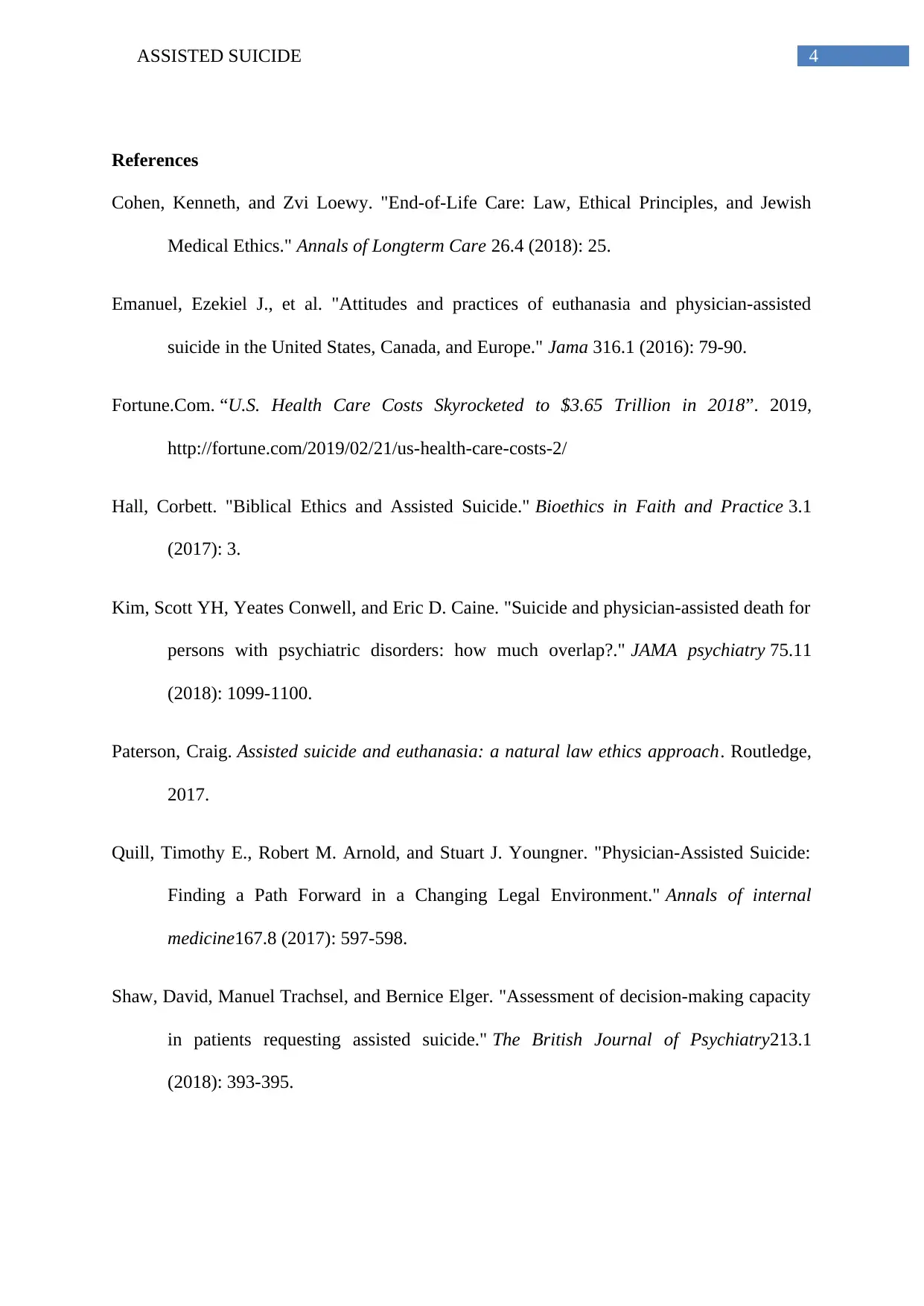
4ASSISTED SUICIDE
References
Cohen, Kenneth, and Zvi Loewy. "End-of-Life Care: Law, Ethical Principles, and Jewish
Medical Ethics." Annals of Longterm Care 26.4 (2018): 25.
Emanuel, Ezekiel J., et al. "Attitudes and practices of euthanasia and physician-assisted
suicide in the United States, Canada, and Europe." Jama 316.1 (2016): 79-90.
Fortune.Com. “U.S. Health Care Costs Skyrocketed to $3.65 Trillion in 2018”. 2019,
http://fortune.com/2019/02/21/us-health-care-costs-2/
Hall, Corbett. "Biblical Ethics and Assisted Suicide." Bioethics in Faith and Practice 3.1
(2017): 3.
Kim, Scott YH, Yeates Conwell, and Eric D. Caine. "Suicide and physician-assisted death for
persons with psychiatric disorders: how much overlap?." JAMA psychiatry 75.11
(2018): 1099-1100.
Paterson, Craig. Assisted suicide and euthanasia: a natural law ethics approach. Routledge,
2017.
Quill, Timothy E., Robert M. Arnold, and Stuart J. Youngner. "Physician-Assisted Suicide:
Finding a Path Forward in a Changing Legal Environment." Annals of internal
medicine167.8 (2017): 597-598.
Shaw, David, Manuel Trachsel, and Bernice Elger. "Assessment of decision-making capacity
in patients requesting assisted suicide." The British Journal of Psychiatry213.1
(2018): 393-395.
References
Cohen, Kenneth, and Zvi Loewy. "End-of-Life Care: Law, Ethical Principles, and Jewish
Medical Ethics." Annals of Longterm Care 26.4 (2018): 25.
Emanuel, Ezekiel J., et al. "Attitudes and practices of euthanasia and physician-assisted
suicide in the United States, Canada, and Europe." Jama 316.1 (2016): 79-90.
Fortune.Com. “U.S. Health Care Costs Skyrocketed to $3.65 Trillion in 2018”. 2019,
http://fortune.com/2019/02/21/us-health-care-costs-2/
Hall, Corbett. "Biblical Ethics and Assisted Suicide." Bioethics in Faith and Practice 3.1
(2017): 3.
Kim, Scott YH, Yeates Conwell, and Eric D. Caine. "Suicide and physician-assisted death for
persons with psychiatric disorders: how much overlap?." JAMA psychiatry 75.11
(2018): 1099-1100.
Paterson, Craig. Assisted suicide and euthanasia: a natural law ethics approach. Routledge,
2017.
Quill, Timothy E., Robert M. Arnold, and Stuart J. Youngner. "Physician-Assisted Suicide:
Finding a Path Forward in a Changing Legal Environment." Annals of internal
medicine167.8 (2017): 597-598.
Shaw, David, Manuel Trachsel, and Bernice Elger. "Assessment of decision-making capacity
in patients requesting assisted suicide." The British Journal of Psychiatry213.1
(2018): 393-395.

5ASSISTED SUICIDE
Sulmasy, Lois Snyder, and Paul S. Mueller. "Ethics and the legalization of physician-assisted
suicide: an American College of Physicians position paper." Annals of internal
medicine 167.8 (2017): 576-578.
Zenz, Julia, Michael Tryba, and Michael Zenz. "Palliative care professionals’ willingness to
perform euthanasia or physician assisted suicide." BMC palliative care 14.1 (2015):
60.
Sulmasy, Lois Snyder, and Paul S. Mueller. "Ethics and the legalization of physician-assisted
suicide: an American College of Physicians position paper." Annals of internal
medicine 167.8 (2017): 576-578.
Zenz, Julia, Michael Tryba, and Michael Zenz. "Palliative care professionals’ willingness to
perform euthanasia or physician assisted suicide." BMC palliative care 14.1 (2015):
60.
⊘ This is a preview!⊘
Do you want full access?
Subscribe today to unlock all pages.

Trusted by 1+ million students worldwide
1 out of 6
Related Documents
Your All-in-One AI-Powered Toolkit for Academic Success.
+13062052269
info@desklib.com
Available 24*7 on WhatsApp / Email
![[object Object]](/_next/static/media/star-bottom.7253800d.svg)
Unlock your academic potential
Copyright © 2020–2026 A2Z Services. All Rights Reserved. Developed and managed by ZUCOL.





